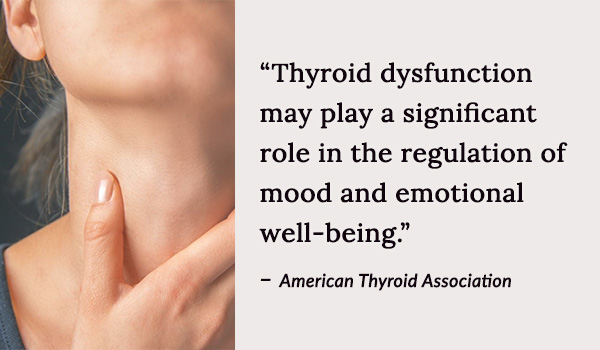Authored by Jacqueline Tourville
Do you ever feel anxious for no clear reason? Are you struggling with panic attacks or an overwhelming sense of nervousness? The cause might be something you haven’t considered and that even your doctor can overlook: your thyroid. As compelling research shows, even mild thyroid dysfunction can be enough to dysregulate mood and the body’s ability to cope with stress.
If you’ve been searching for answers to your anxiety, it’s time to explore whether the health of your thyroid could be involved.

How low thyroid triggers anxiety and panic attacks
The thyroid, a butterfly shaped gland located at the base of your neck, produces hormones that play a crucial role in regulating nearly every system in your body. This includes metabolism, energy levels and neurotransmitter activity in the brain and nervous system.
When your thyroid is functioning optimally, you’re more likely to feel energized, calm and balanced. However, when the thyroid becomes underactive and enters a state of hypothyroidism (low thyroid function), the delicate balance of neurotransmitters that regulate mood and stress become disrupted.
For example, GABA (gamma-aminobutyric acid), a key neurotransmitter that calms the nervous system, is often impacted by low thyroid levels. When thyroid hormones are insufficient, GABA levels decrease, diminishing its calming effects and heightening the risk of anxiety and panic attacks.
Low thyroid function can also reduce serotonin activity, another critical neurotransmitter, leading to symptoms such as low mood, irritability and increased sensitivity to stress.
Sudden spikes in stress hormones
Thyroid hormones also regulate the autonomic nervous system, which controls heart rate, blood pressure and circulation. When thyroid levels are low, these systems can slow down, causing symptoms like low blood pressure, poor circulation and dizziness. To counter this slowdown, the body may produce higher levels of stress hormones, like adrenaline and norepinephrine, which can cause heart palpitations, a racing heartbeat and an exaggerated stress response—mimicking an anxiety attack and amplifying feelings of nervousness.
Hormonal imbalances during perimenopause and menopause
Fluctuating estrogen levels during perimenopause and menopause can disrupt thyroid hormone production, which is why many women experience thyroid issues for the first time during these stages of hormonal transition. Changes in progesterone levels—another hormone in flux during menopause that helps regulate mood and stress—can further intensify anxiety symptoms.
Why doctors miss the thyroid-anxiety link
In today’s fast-paced healthcare system, the average doctor’s appointment lasts around 15 minutes. So when anxiety or panic attacks are brought up by patients, the solution is often a quick prescription for an anti-anxiety medication. It’s easy. It’s convenient. However, this approach only addresses symptoms and doesn’t take the time to get at the real root cause.
Studies show that up to 60% of people with thyroid disease are unaware of it, and women are five to eight times more likely than men to develop thyroid disorders. Without proper testing and care, many women go undiagnosed and are prescribed medications they would’t need if the underlying thyroid condition was addressed.
5 steps for natural thyroid support
If you suspect your thyroid may be contributing to your anxiety, here are some natural steps to support your thyroid health and mood stability:
Nourish your thyroid with key nutrients
To support thyroid health, it’s essential to provide your body with the right nutrients:
- Iodine is crucial for thyroid hormone production and can be found in seaweed, iodized salt, and fish like cod and tuna. A deficiency in iodine can lead to hypothyroidism.
- Selenium helps regulate thyroid hormones and reduce inflammation, playing a key role in converting T4 thyroid hormones to the active T3 form. Foods like Brazil nuts, tuna, and eggs are rich in selenium, which has been shown to improve thyroid function.
- Zinc supports thyroid enzyme activity and hormone production, and a deficiency is often linked to hypothyroidism. Good sources include pumpkin seeds, chickpeas, and beef.
For additional support, consider a high quality comprehensive thyroid supplement like T-Balance Plus which provides our exclusive blend of iodine, selenium, zinc, and other beneficial micronutrients to correct low thyroid function and restore thyroid health.
Manage stress levels
A study published in The Journal of Clinical Endocrinology & Metabolism found that excess cortisol can inhibit the conversion of T4 to T3, resulting in lower levels of active thyroid hormone. Managing stress helps keep cortisol balanced, preveting it from harming the thyroid. To lower excess cortisol, try practices such as yoga, meditation, deep breathing, and gentle exercise like walking or swimming. Using a cortisol balancing supplement like Serinisol is another tool to reduce excess production of the hormone.
Prioritize restorative sleep
Quality sleep is vital for thyroid health, as it allows the body to regulate hormone levels and repair tissues. According to a study in the Endocrine Journal, sleep deprivation is linked to lower levels of TSH (thyroid-stimulating hormone), disrupting thyroid hormone balance. Aim for 7-9 hours of quality sleep each night to support healthy thyroid function and reduce anxiety symptoms.
Limit sugary, processed foods
A diet high in processed foods and sugar can increase inflammation in the body, potentially worsening thyroid dysfunction. Inflammation impairs the thyroid’s ability to produce and regulate hormones effectively. Focus on whole, nutrient-dense foods to support overall health.
Consider going gluten free
Research shows that individuals with autoimmune thyroid disease such as Hashimoto’s thyroiditis are more likely to have gluten sensitivity or celiac disease, both of which contribute to inflammation and place additional stress on the thyroid. Many women have reported to us that going gluten free had them see a real reduction in their anxiety systems, making it worth a try.
Is caring for your thyroid the missing piece to your emotional well-being?
Anxiety and panic attacks can have many causes, but if you’ve been experiencing persistent symptoms without relief, it’s worth checking in to see if low thyroid could be the missing piece of the puzzle. By addressing thyroid function and supporting it naturally, you may find that your anxiety fades and your energy returns.
Check out the symptoms of low thyroid and take our free Thyroid Health Quiz to check in on the state of your thyroid. If you suspect your thyroid could be affecting your emotional well-being, don’t ignore the signs. When you take charge of your health, the countdown to feeling like yourself again can begin.
















